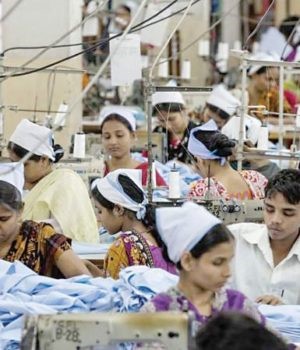 Most garment workers out of formal banking system
Most garment workers out of formal banking system
April 22, 2018
Majority of the garment workers in the country have been left out of the formal banking system as they are paid wages in cash, experts at a panel discussion said Thursday. They also recommended taking up pragmatic and commercially viable projects to bring the large workforce under formal banking system and improve their financial security. The discussion on ‘Financial Inclusion in the RMG Sector in Bangladesh: Building the Ecosystem’ was held at the launching ceremony of a 30-month project ‘Sarathi – Progress through financial inclusion’ at a city hotel. State minister for finance MA Mannan launched the project funded by Swiss contact and MetLife Foundation. Md Shafique Rahman Patwari, chairman of Insurance Development and Regulatory Authority (IDRA), Anirban Bhowmik, country director of Swiss contact Bangladesh, Nurul Islam, chairman of Metlife Bangladesh, Nepal and Myanmar, and Mansoor Ahmed, first vice-president of Bangladesh Knitwear Manufacturers and Exporters Association (BKMEA), were present at the launching ceremony. About 4.5 million workers are employed in the country’s readymade garment sector. Despite their significant contribution to the national economy, majority of the workers remain cut off from the formal banking system, having limited or no access to financial services, said Anirban Bhowmik.The project will be implemented in partnership with major commercial banks that will design and offer customized financial products through their mobile and agent banking channels, he said. Nurul Islam said the objectives of the project are to ensure access to finance and financial security of the RMG workers, majority of whom are women. “Only 10 per cent of the garment workers’ monthly wages are paid through formal banking channel, keeping majority of them out of financial inclusion,” said Khondaker Golam Moazzem, research director, Centre for Policy Dialogue. A total of Tk 25.22 billion is paid to some 3.5 million garment workers in wages a month, he said, adding that the workers average Tk 7,000 a month. Savings of garment workers are negligible, only 3.0 per cent, due to lack of their access to banking facility, he said. Though transparency is a big issue for wage payment and its date, large companies can accommodate the process which can later be introduced in medium and small sized factories gradually, he said. He also suggested launching awareness programmed both for workers and entrepreneurs and providing government’s financial and incentive support in order to encourage entrepreneurs to use the banking system.Mashrur Arefin, additional managing director of City Bank, said garment workers still prefer cash as they found it difficult to use ATM card.He also called for changing the mindset to promote agent banking, which is less risky and less costly, and working out pragmatic and realistic programmed to ensure financial inclusion of RMG workers. The Sarathi project aims to bring at least 30 RMG factories onboard to disburse the workers’ wages through opening 60,000 bank accounts, said Sarathi team leader Kazi Mahfuz Mamtazur Rahman in his keynote paper. It also targeted to improve their basic financial literacy on topics such as how to use bank accounts and cards, benefits of savings products, gaining control and privacy over earnings, how to plan and pay for recurring expenses and gaining access to savings and credit, he added.
Source:

